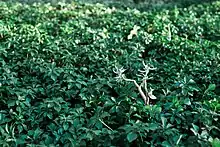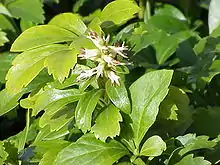Pachysandra
Pachysandra /ˌpækiˈsændrə/[1] is a genus of five species of evergreen perennials or subshrubs, belonging to the boxwood family Buxaceae. The species are native to eastern Asia and southeast North America, some reaching a height of 20–45 cm (7.9–17.7 in), with only weakly woody stems. The leaves are alternate, leathery, with a coarsely toothed margin, and are typically 5–10 cm (2.0–3.9 in) long. The small uni-sexual blooms are greenish-white and produced in late spring or early summer.[2]

| Pachysandra | |
|---|---|
 | |
| Pachysandra terminalis | |
| Scientific classification | |
| Kingdom: | Plantae |
| Clade: | Tracheophytes |
| Clade: | Angiosperms |
| Clade: | Eudicots |
| Order: | Buxales |
| Family: | Buxaceae |
| Genus: | Pachysandra Michx. |
| Species | |
|
See text | |
Species
- Pachysandra axillaris - China
- Pachysandra coriacea (sometimes classified as Sarcococca coriacea) - India, Nepal, Myanmar
- Pachysandra procumbens - Allegheny Pachysandra (southeast United States)
- Pachysandra stylosa - China (sometimes treated as a variety of P. axillaris[3])
- Pachysandra terminalis - China, Japan[4][5]
Cultivation and uses
Pachysandra can grow in deep-shade areas and is thus well-suited and popular as ground cover for shade gardens. The most commonly used species is P. terminalis, the Japanese spurge, which is an aggressively spreading evergreen ground cover. It is very deer-resistant. The form 'Variegata' has leaves attractively variegated green and creamy white, and is slightly less invasive. 'Green Sheen' Pachysandra has extra glossy leaves and slowly spreads. All species in this genus prefer a well-drained soil with a high humus content.
References
- Sunset Western Garden Book, 1995, pp.606–607.
- RHS A-Z encyclopedia of garden plants. United Kingdom: Dorling Kindersley. 2008. p. 1136. ISBN 978-1405332965.
- 2b. Pachysandra axillaris var. stylosa (Dunn) M. Cheng, Flora of China
- GRIN Species Records of Pachysandra, GRIN Taxonomy for Plants
- 3. Pachysandra A. Michaux, Flora of China
External links
| Wikimedia Commons has media related to Pachysandra. |